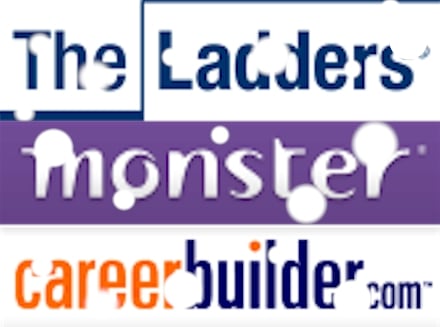Next week I’m doing a presentation to a group of alumni from Cornell University’s Johnson School of Business, about how to work with headhunters. These are seasoned executives who have been running companies for 7-15 years, and who turn to their alma mater’s Career Management Center for an added edge. What they want to know is, how can they get a good headhunter’s attention? What’s the big secret? And, how can they speed up the process?
When I do such talks, I usually find my theme in a current controversy. This time, it surfaced in a BNET blog posting by Jessica Stillman: Secrets of Job Hunting in a Post-Job Board World.
Kudos to Stillman for even writing about “a post-job board world.” Her article is really about how to get past the job boards by getting the attention of real, live people, including headhunters. In referring to a list of “tips” from yet another blog, Stillman triggered afresh a controversy that I think has long bewildered job hunters at all levels: If you decide to forget the job boards, can you really find a job by developing real, live contacts?
I found the theme for my Cornell presentation by picking at some of the suggestions Stillman passes along. Let’s see where it gets us.
 Be findable: But who do you want to find you?
Be findable: But who do you want to find you?
In Stillman’s posting, the “seven things employers should tell job seekers about how to get considered” starts with some suggestions about using keywords to be “findable.” Let’s be careful here. If you want to be findable to headhunters, there are headhunters, then there are headhunters. How you set yourself up to be found depends on what kind of headhunter you’re trying to appeal to.
The majority of “headhunters” aren’t really headhunters. They’re dialing-for-dollars, and they are indeed looking for your keywords, because they understand little about the industries and companies they recruit for. They rely on buzzwords to “turn up” resumes that they blast out in bulk to their “clients.” To such headhunters, clients are any companies that are advertising jobs — and the “headhunters” throw resumes at them, hoping the spaghetti will stick to the wall and earn a fee. It’s a numbers game. When you feel a “headhunter” has wasted your time, it’s because the wrong one found you.
What’s really key?
Good headhunters aren’t looking for keywords. They are looking for key people, in places like discussion forums where the best and brightest are talking shop. Good headhunters look for substance, and for the gurus that others turn to for advice. They target those discussion leaders as potential candidates. It takes a lot more than keywords to get the attention of good headhunters, who are looking for complete sentences and proof of skills and reputation.
So, be careful how you make yourself findable. The keyword/buzzword route will waste a lot of your time, because it attracts flies. The ability to talk shop with your peers, and to develop a strong reputation, will get the long-term attention of good headhunters. Once they identify you, they will start to follow you around, because those headhunters realize that you’re not just a potential candidate. You will likely lead them to other good candidates.
Find good headhunters by going where they hang out.
These important distinctions between headhunters also suggest how you need to appeal to the ones you’re interested in. Although good headhunters use the Net in deliberate, thoughtful ways to identify movers and shakers in the community they recruit from, they don’t spend most of their time behind a pc, waiting for names to turn up in response to search strings and keywords. They don’t scour the stale databases of job boards for resumes. So, where else do they hang out?
 They attend industry events. They circulate in real time in the real world. Are they going to find you out there, among the movers and shakers in your business, who hang out with like minds? Do you go to such events? Do you attend seminars and presentations? Do you take continuing education courses? Do you contribute your knowledge and expertise at such events, as a presenter or teacher? Do you have a real life in your industry? That’s where good headhunters are looking for you — in the real world.
They attend industry events. They circulate in real time in the real world. Are they going to find you out there, among the movers and shakers in your business, who hang out with like minds? Do you go to such events? Do you attend seminars and presentations? Do you take continuing education courses? Do you contribute your knowledge and expertise at such events, as a presenter or teacher? Do you have a real life in your industry? That’s where good headhunters are looking for you — in the real world.
Good headhunters don’t gather dead resumes.
The suggestion that it’s important to “post your resume” is troubling. Lots of the most talented people don’t even have resumes. Their resumes are represented by the chain of their contributions to their field, by the people they influence, and by the circle of friends  they belong to. Their living resume is often found in the pages of the industry press, across discussion forums, and in the products they design, make, and sell. It’s also on the lips of other industry notables, who are quick to recommend experts they know and trust. That’s the living resume — it doesn’t have to be written, or on paper. It’s the resume that good headhunters are looking for.
they belong to. Their living resume is often found in the pages of the industry press, across discussion forums, and in the products they design, make, and sell. It’s also on the lips of other industry notables, who are quick to recommend experts they know and trust. That’s the living resume — it doesn’t have to be written, or on paper. It’s the resume that good headhunters are looking for.
If you are going to have a written resume, then it matters where you post it. If you have a blog where you teach your peers something useful, that’s a high-quality place to put your resume, because the blog proves the resume and brings it to life. If you participate actively on professional forums, where you are tested, critiqued, and judged by your peers, that’s good, too. That’s where good headhunters hang out, looking for living proof of talent. But slapping a written resume all over the job boards will just make you look desperate or too-easily available. That’s a dead resume, because there’s no proof connected to it. The spaghetti headhunters that pick your resume off one board or another will soon have you splattered all over kingdom come.
What kind of headhunter?
The dig about contingency headunters, in the list of tips that Stillman quotes, is a shallow one. Some of the best headhunters work on contingency. That is, they get paid only if they fill a position. Retained headhunters get paid whether they fill a position or not, and whether they find the candidate or whether the candidate is recommended by the hiring manager’s brother. Both kinds of headhunters can do an excellent job; they just operate under different models. Don’t make the mistake of dismissing the contingency folks; they fill some of the tastiest positions. Judge headhunters by their behavior, not by how they bill their fees. (For a comprehensive look at how headhunters operate, see How to Work with Headhunters… and how to make headhunters work for you.)
What is killing the job boards?
I agree with this in Stillman’s column: Some recruiters will keep using job boards, but job boards will also continue to commoditize people. Most job boards rent, trade, sell, and “scrape” resumes. There are quite a few legitimate niche job boards, like Dice.com. But the only honest general-purpose job board I know  is LinkUp.com, because it does just one thing: match people to real jobs.
is LinkUp.com, because it does just one thing: match people to real jobs.
Otherwise, the job board business has become so corrupt that its model no longer has anything to do with filling jobs. It sells stale data to wishful employers and desperate job hunters, and also “upsells” that data to companies that make money from it in other (sometimes questionable, sometimes illegal) ways. (What do you think is one of the leading channels of identity theft?) That’s why you find expired three-year-old jobs on services like TheLadders, and it’s why you get e-mails from spaghetti headhunters long after you thought you removed your resume from a job board. These job boards don’t care if you find a job, they just want you to keep coming back to look for one, and they will “curate” your resume forever, all over the Net.
Yes, some recruiters will keep using job boards, and some employers are looking to buy spaghetti. But the uproar from angry customers — both job seekers and employers — is what’s killing the job boards.
You don’t need to “sell” yourself to someone who trusts you.
Today, the biggest load of bullshit in the career industry is that getting a great job is all about selling yourself. This popular metaphor — that you are a product — leads to dangerously useless practices, like creating a “brand” and “making your resume your marketing piece” and having “an elevator pitch.” While a succinct outline of who you and what you’ve done can be useful, what really matters is demonstrating what you can do next, with whom, and for whom.
 And you need to express that only to the tightknit circle of friends who do the work you want to do (whether they know you yet, or not). That’s a tall order — and it’s a whole lot harder than “selling.” You have to build a life and a cohort and a reputation over time. You must be one of the best in your business, whether at entry level or as an executive.
And you need to express that only to the tightknit circle of friends who do the work you want to do (whether they know you yet, or not). That’s a tall order — and it’s a whole lot harder than “selling.” You have to build a life and a cohort and a reputation over time. You must be one of the best in your business, whether at entry level or as an executive.
To a good headhunter, substance always matters more than sizzle. And to communicate your substance, you need more than a resume, or a bunch of keywords, or a good pitch. You need to be part of a circle of friends — people who do the work you want to do — that imbues you with a fine reputation. Far from selling anything, you have to earn your way in by making a substantial contribution. Headhunters will find you among people who know, trust and respect you. Not splattered on a wall for the world to pick at.
In the end, getting hired by a good company, or through a good headhunter, is about being able to demonstrate what you can do to bring success and profit to a company’s bottom line — not about how you advertise your availability. Even if you like to operate below the radar, good headhunters and good employers will find you, because people they trust put their own reputations on the line and recommended you. Not because you spread your keywords around somewhere.
.

Dear Nick,
I think this advice is almost indistinguishable from your advice on how to find a real job. This is not a criticism! The advice is valid. But I think if we’ve read your column and blog enough all we have to do is substitute headhunter with hiring manager.
However, in my experience, most of the good headhunters I know left this business because they couldn’t make money in the last 10 years. Jobs are too scarce. Unemployment is still around 10% in this country.
So I would have answered the question about how to find a good headhunter with ‘You don’t need them. Find a good hiring manager”.
Hi Lucille,
I can promise there are still a few of us left who, due to long term relationships,are asked to find people for top jobs that are not listed anywhere. Sometimes only the top people in HR even know that a job has been or will be created.
Those of us who have been around for a long time have made money, even during this recession. A lot of the jobs we recruit for may only be known to CEO or the President of the Board of directors.
It’s always great for a candidate to be able to find a hiring manager but many times you can’t or the hiring authority is the one who called the headhunter in the first place.
Headhunters are many times retained by the hiring manager or company because they prefer not to talk to candidates about a replacement position until the candidates have been prescreened by the headhunter.
If we can find you we may be able to talk to you about jobs you would never locate in any other way.
Dear Sandra,
Thank you for the offer. I am glad to be wrong about this.
Job that are not posted are a market distortion.
A good head hunter has to acquire a very high degree of confidence from the employer in order to be able to have access to senitive jobs that are not normaly posted.
It could be a good way to ditinguish one headhunter from the next.
@Fernando: A lot of positions are assigned to headhunters and never posted on a company’s website or elsewhere. The reason is simple: The company has decided to pay for headhunting services, so it does no good to also invite thousands of applications separately. Those apps would have to be reviewed and processed by the HR department, at a significant cost to the company. Why do both, if you’ve budgeted a headhunter’s fee? People don’t realize what it costs a company to process thousands of incoming resumes, especially when most of them are spurious and purely opportunistic — from people who have no idea whether they qualify for the job. (They expect HR to make the judgment — and that’s very costly.)
I read everything that Nick writes. Why? Because he has that great way of talking fearlessly. To speak his truth.
What I like about this article, is that it speaks to what has been going on since the beginning of my time, as a recruiting consultant.
Which is, good recruiters know how to find good people. And good people, if they want to be found, can be found. WITHOUT USING JOB BOARDS.
The thing is, only a skilled recruiter who is very good at what they do, does research. My dad taught me about research long ago during his career as an Anthropologist.
Talking with people, finding out where people like them study, what they read, how to find them, is what anthropologists do.
A good recruiter is like an anthropologist. Living people = living resumes.
Make sense?
Since I added this comment, I see John, your perspective is from the job hunter. I think it’s always our job to educated people and one of the biggest misconceptions out there is that recruiters are somehow….well…job hunters.
Sometimes jobs are posted on a company website and elsewhere but often they don’t throw up the right calibre of applicant (or at least HR doesn’t find the ‘gems’ hidden in the pile of CVs).
I was instructed on assignment this morning where this is the case.
For the record, we won’t be using keywords or job boards to source candidates for the role!
Job boards are not “totally” useless. They contain weblinks to company sites that give a starting point. Some times I find out a company exists this way and where they are and what they do and also who their competitors are. They (job boards) are just that — information clearing houses
@Edward: That’s the way to use job boards: for information. But to confirm it, you have to do a lot more. When I first started headhunting, my boss had us all subscribe to the San Jose Mercury News. Our task on Sunday mornings was to go to the Silicon Valley classifieds and clip every job ad from every company we wanted to do business with, and then to start clipping articles about those companies from the business and industry press. Then we’d paste these into a book. Then we’d start putting the pieces together — it was a great way to learn about companies in the valley. But the final step in our education was always this: Take someone from a company to lunch. That’s how we got our business. By educating ourselves first, and meeting people next.
NIck, brilliant, real-world wisdom, as always. I love the idea of a living resume. If we’re to transform job seekers’ behaviors it’s good to start with what they understand. Everyone thinks they need a resume, although we know it’s the least important part of their job search (and may even be a detriment).
I think that people will relate to the concept of a living resume, more than the usual advice –“Get out there and network, be a thought leader, and go to conferences.” If a jobseeker realizes every action they take should be a strategic addition to their living resume, that’s real progress!
BTW, in the many years I’ve been helping position senior execs for job search or a planned career move, I can’t think of one who has found a position via a job board. They know better. They have been found through being strongly branded in the marketplace as a value-producer– and landed opportunities via contacts, being recruited, or even cold calling a company.
Keep on telling it like it is!
I still keep getting calls from so-called “head hunters” with crappy positions I’m not interested in (short-term contracts involving some arcane skillset I don’t have thousands of miles from home) or offers to sell life insurance.
Just ONCE I would like to be contacted by an honest head hunter who had a high-paying local offer to do something I have proven ability to do exceptionally well, as an employee rather than a contractor. (YMMV on the contractor v. employee angle; I get that.)
However, I am not holding my breath. As long as combined un- and under-employment is in the range of 25%+, companies will not be looking for that many people, because the economy is bad. And the economy will never pick until companies start filling middle- and upper middle-class in quantify.
I know: Captain Obvious. So why don’t the best and brightest in government and private industry see it, and come up with a quick solution?
Hi Nick,
Great article. You refer to positions that earn a ton of money compared to the average Joe. I was recruited to a mid-level position in an engineering firm through a posting on a big job board. Within 15 minutes of applying this niche recruiter within a large recruitment firm called me, leading to further interviews and then landing the job. While I agree on one hand that companies don’t want to pay massive fees purely for job board trawlers, I think you do give HR too much credit. This company was around 1800 employees and had several verticals. I don’t think many of the HR people would really know what hiring managers were looking for, especially compared to my recruiter who knew his stuff. I dealt directly with my recruiter and then two managing level engineers at the company. Not an HR person in sight until I had the job and was finishing the paperwork.
IMHO, job boards are still a useful tool for recruiters as not all positions lend themselves to having a great network of contacts on which to draw, especially if you are not sure what companies to look at as a job seeker.
@Robert: Congratulations on your new job and thanks for sharing some of the details about how you got it.
Part of what you say puzzles me, because in the many years I’ve been publishing Ask The Headhunter (in various venues and formats), I’ve tried to address issues that people face through a huge range of compensation levels. I recently told the story of a guy who used my suggestions to land a job as technician in a blood lab, though I certainly do discuss issues that executives face.
As for HR, well, no one has ever accused me of giving HR too much credit! Try this: http://www.asktheheadhunter.com/2142/reject-how-hr-engineered-its-own-funeral
Congrats again, and I hope you’ll check out the rest of Ask The Headhunter! (Try the newsletter, if you haven’t already.)
Thank you for the reference to LinkUp.com — I was not aware of that one, and a short search on that site turned up a company that might be a better fit for me than the Monster/Dice/TWC listings that I have been chasing.
I wonder if maybe I should remove my Monster and Dice profiles?
This is a great article, and great comments. I love the term that describes head hunters as “dialing for dollars”. That couldn’t be truer. I think that is why a lot of companies today want to get away from hiring recruiting firms, and have a go at it themselves.
That being said, now to job boards. One expression I’ve heard being used is “dumpster dive”. Jobs boards have only worked when they first came out in 1994 and while the economy was good and there were more jobs than candidates. They have been ineffective for many years, just taking companies’ money, and not delivering, and creating a false illusion. None of them work – not even Linkup.com which was mentioned here. I tried going on that site. I got nothing remotely close to what I was looking for. I hope what’s killing job boards will finally kill them for good. We need an entirely new approach to hiring – not a job board, and not recruiting firms.
Are on-line applications as ineffective as job boards?
Also,I have a hard time getting replies from people I’ve met with about starting a business. They express interest, even excitement, about my plans. I give them the time, space, and money requirements to get the business started, as they requested, but then….silence. What to do?
Great Post! Your point about resumes was spot on- ironically, they’re the things which are most neglected by job hunters.